|
|
|
Sort Order |
|
|
|
Items / Page
|
|
|
|
|
|
|
| Srl | Item |
| 1 |
ID:
159572
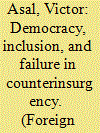

|
|
|
|
|
| Summary/Abstract |
Why do the strong lose? Intuitively, stronger violent actors should win in wars against weaker actors. The literature on insurgencies suggests that democracies will do worse than other countries. However, there is little quantitative literature on why states succeed or fail in their efforts against insurgencies, and the key works find that democracy does not matter. We argue that the combined effect of political inclusion and political competition present in inclusive democracies is a key missing component impacting the success or failure of counterinsurgency (COIN). When procedural elements of democracy are combined with political inclusion, countries are less likely to be successful at suppressing insurgencies because normatively they are less willing to be as repressive and ruthless as necessary. We find that inclusion and procedural democracy separately have no impact on COIN success; however, when combined, the impact is significant, large, and negative. Inclusive democracies lose COIN operations more often than their counterparts.
|
|
|
|
|
|
|
|
|
|
|
|
|
|
|
|
| 2 |
ID:
159570


|
|
|
|
|
| Summary/Abstract |
Extant research has not produced consistent findings on the relationship between domestic political problems and the use of force abroad. We argue that this ambiguity results from incomplete theorizing and flawed empirical tests. We advance the understanding of diversionary uses of force by highlighting the political bias that domestic problems create for a leader and how this political bias interacts with the power relationship between diverters and potential targets. This conceptual discussion clarifies the political incentives each actor has to engage in military conflict and leads to a novel hypothesis. For example, domestic problems increase the probability that a weak state will attack a strong state, but domestic problems will have little effect on changing the probability of conflict between strong and weak. Empirical tests of the hypotheses for the period 1946–2000 are consistent with the argument.
|
|
|
|
|
|
|
|
|
|
|
|
|
|
|
|
| 3 |
ID:
159568
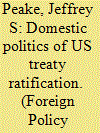

|
|
|
|
|
| Summary/Abstract |
Treaties represent an important policy mechanism in US foreign policy. There are good reasons to expect that the political process underlying treaty ratification in the United States is structured by the partisan political context, the policy context including the policy agenda, and, in the case of bilateral agreements, the relationship between the treaty partners. I analyze the duration of the ratification process for all bilateral treaties transmitted by the president to the Senate from 1949 to 2012. I focus the analysis on two key stages where delay is most common: the presidential transmittal stage and the Senate Foreign Relations committee stage. Analysis indicates that presidential resources, partisan polarization, the broader policy agenda, and the value of the treaty structure presidential decisions on treaty transmittal. I find less support for these factors at the committee stage; however, the committee processes treaties with democracies more quickly than treaties with other states. The results have important implications for US foreign policy.
|
|
|
|
|
|
|
|
|
|
|
|
|
|
|
|
| 4 |
ID:
159574


|
|
|
|
|
| Summary/Abstract |
In the conflict bargaining literature, three variables have a primary explanatory role: relative power, status quo conditions, and leadership preferences. While leadership preferences loom large in case study research, they are either absent or poorly proxied in large-N statistical studies. Using a series of three experiments, we test for the effects of relative power, status quo conditions, and leadership preferences on decisions to apply various levels of nonviolent and violent pressure in ethno-territorial disputes. The experimental designs presented in this study offer the opportunity to isolate the impact of leadership preferences on political strategy choices in ethno-territorial disputes. The results demonstrate that, at least in an experimental setting, leadership preferences are, in fact, significant predictors of political strategy choices, even after controlling for relative power and status quo conditions.
|
|
|
|
|
|
|
|
|
|
|
|
|
|
|
|
| 5 |
ID:
159575


|
|
|
|
|
| Summary/Abstract |
Do leaders learn more about military force from firsthand experience with the armed forces or their nation’s last war? Despite a resurgence of interest in the effects of leaders and their beliefs on international conflict and war, we still know little about which mechanisms cause what beliefs. I theorize that although personal experiences in the military may provide less normatively probative lessons for a leader contemplating the initiation of armed conflict than the nation’s last war, personal military experiences will have a greater impact on beliefs because they are directly experienced, cognitively accessible, and vivid. I argue that this availability bias should make leaders who have experience in the military but not combat operations develop beliefs that make them more likely to use force than leaders with combat experience. I test this hypothesis on the beliefs of John Kennedy and Lyndon Johnson with archival evidence and secondary studies. These cases control for the nation’s last war because both Kennedy and Johnson experienced the second World War but allow variation in military experience because Kennedy but not Johnson experienced combat. The results suggest that further attention to leaders’ personal military experiences will offer better predictions about their beliefs and foreign policies.
|
|
|
|
|
|
|
|
|
|
|
|
|
|
|
|
| 6 |
ID:
159573
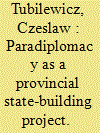

|
|
|
|
|
| Summary/Abstract |
This article examines Yunnan’s relations with the Greater Mekong Subregion (GMS) countries grouped in the Asian Development Bank’s (ADB) GMS Program. While locating the analysis in the context of paradiplomacy, this article makes two claims. First, it argues that—unlike subnational governments in federal states—Yunnanese authorities do not use domestic opportunity structures to develop the province’s international agency. Instead, they pursue paradiplomacy as a subnational state-building project, designed to extract economic assistance from the central state. Second, it asserts that—unlike other Westphalian states—the Chinese government has recognized the benefits of paradiplomacy as a way to enhance the structural competitiveness of its borderland provinces in the regional economy. In doing so, it has proactively deployed provincial authorities in the multilevel governance of the GMS Program. At the same time, the central government has remained at the center of Yunnan’s external relations through providing funding and preferential policies for Yunnan’s internal and external economic projects and defining the parameters of Yunnan’s cooperation with the GMS countries and the ADB.
|
|
|
|
|
|
|
|
|
|
|
|
|
|
|
|
| 7 |
ID:
159576
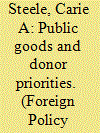

|
|
|
|
|
| Summary/Abstract |
Over the past two decades, development assistance for health (DAH) has reached record levels. Yet, many developing states continue to struggle with diseases easily prevented and treated in industrialized states. Within the aid literature, DAH has historically been viewed as technical rather than political and has been largely disregarded. I argue that, like other forms of foreign aid, DAH may be subject to political influences; and that identifying those interests requires moving beyond dyad-level conceptualizations of political interests. I apply a public goods model to bilateral aid allocations for infectious disease control, using disease characteristics to specify recipients’ need and donors’ interests. I use an original dataset to model disease-specific aid allocations. The results suggest that, within the public goods setting of global disease control, bilateral donors allocate aid to maximize their own payoff. In addition, this analysis provides a theory-driven explanation for poor health outcomes in many developing countries where aid allocations fail to match need.
|
|
|
|
|
|
|
|
|
|
|
|
|
|
|
|
| 8 |
ID:
159571
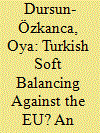

|
|
|
|
|
| Summary/Abstract |
Turkey is increasingly criticized for obstructing communication and coordination between the European Union (EU) and the North Atlantic Treaty Organization (NATO). Using soft balancing theory and drawing on fieldwork and semistructured elite interviews conducted in Turkey, this article provides an in-depth analysis of Turkey’s foreign policy that leads to an impasse in NATO–EU coordination. It identifies three main reasons behind the Turkish foreign policy on the topic: (1) Turkey’s resentment for its exclusion from European security developments, (2) the uncertainties revolving around Turkey’s EU membership prospects and the subsequent lack of trust toward the EU, and (3) the unresolved Cyprus problem. This article concludes that the provision of a credible roadmap for Turkey’s EU membership and the resolution of the Cyprus conflict are central for breaking the NATO–EU security impasse, both of which seem unlikely in the short to medium run.
|
|
|
|
|
|
|
|
|
|
|
|
|
|
|
|
| 9 |
ID:
159566
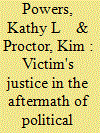

|
|
|
|
|
| Summary/Abstract |
Governments often award reparations to victims of mass human rights violations (HRVs) committed during political violence. Although international law requires that governments compensate victims of such violations, some states award reparations while others do not. This paper provides the first global analysis of the determinants of state reparations awards to victims of HRVs. Analyses consider the effects of multiple factors on reparations awards, whether a country has used other types of transitional justice mechanisms, economic development, and regime type. Spatial and rare events logit analyses on a new database for all countries between 1969 and 2006 suggest that wealthy, democratic countries as well as governments that already employ other transitional justice mechanisms are more likely to actually pay reparations to victims than are other governments.
|
|
|
|
|
|
|
|
|
|
|
|
|
|
|
|
| 10 |
ID:
159565
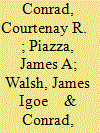

|
|
|
|
|
| Summary/Abstract |
Do governments respond to terrorism with torture? Although governments face incentives to increase torture in response to terrorist attacks, previous research finds no relationship between terror and state torture. We argue that this is unsurprising because incentives to violate human rights differ across domestic government agencies. Using new data that disaggregates state torture by the government agency responsible for the abuse, we investigate the effect of transnational and domestic terrorism on torture perpetrated by military officials. We find that military agents—especially those in democracies—engage in substantively more widespread torture when confronted with terrorism and that this behavior is particularly likely in response to transnational attacks.
|
|
|
|
|
|
|
|
|
|
|
|
|
|
|
|
| 11 |
ID:
159567
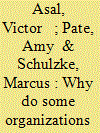

|
|
|
|
|
| Summary/Abstract |
This study addresses the question of why organizations choose to use violence as a strategy using the Political Organizations Dataset (POD) data set, which includes both violent and nonviolent organizations from the Middle East. Our findings show that religious ideology and social service provisions have less influence on this decision than the existing literature suggests. They also reveal that organizations that advocate the exclusion of women from public life, those that advocate a change in state boundaries, and those that experience state repression are more likely to use violence.
|
|
|
|
|
|
|
|
|
|
|
|
|
|
|
|
| 12 |
ID:
159569
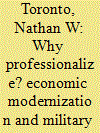

|
|
|
|
|
| Summary/Abstract |
Why do states professionalize the military? Professionalizing the military represents a strategic commitment to a particular set of ideas about the role of the military, and the timing and strength of this commitment to military professionalism have varied widely between countries, especially non-European ones. Understanding this process is important in an era of defense austerity, when the choice of how to spend defense resources has deeper political consequences than it used to. Despite the importance of this question, there have been almost no large-n studies of military professionalization. Analyzing new data on more than 150 countries from 1800 to 2005, this study finds that states with greater levels of human capital, urbanization, and economic wealth are more likely to professionalize. What is more, these indicators of economic modernization have a substantially stronger correlation with measures of military professionalism than regime type and international security concerns. These findings should inform security assistance operations by emphasizing the development of human capital in recipient officer corps and drawing links between economic development and security assistance programs.
|
|
|
|
|
|
|
|
|
|
|
|
|
|
|
|
|
|
|
|
|